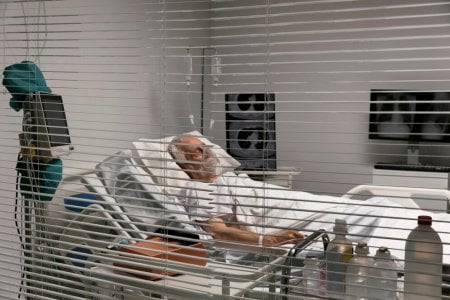Heartbreaking: Older Man's Life Cut Short After Miscommunication at Care Facility
By
- Replies 11
Just a trigger warning members, as this article discusses death. If you’re ever in need of some help and assistance in emergency situations, you can check out this incredible article which can save your life even when you can’t speak on the phone.
It's a heartbreaking story to report – the tragic death of 68-year-old Wayne Victor Rouse at Tandara Lodge aged care home has highlighted the potentially devastating results of a miscommunication among staff.
Rouse, a resident of the home, had rung his bell on June 14th for assistance with a medical emergency. By the time help arrived 8 minutes later, the elderly man was already lying on the floor, unconscious, with no pulse.
Coroner Robert Webster, who investigated Rouse's death, revealed that staff had not attempted to resuscitate the 68-year-old as they believed he had an active do-not-resuscitate (DNR) order in place.
However, it later emerged that Rouse did have the opposite wish – to have CPR if necessary as indicated in his medical records. While medical evidence suggested that he would not have been revived had the attempt been made, the failure to provide CPR was still contrary to his expressed wishes.
An unfortunate mixup in the documentation and communication procedures of the aged care home was cited as the cause of the miscommunication. Added to this, the nurse and care-worker present at the time were both already engaged in caring for another resident, leaving no one to attend to Rouse.
Webster noted this staffing issue and recommended that Tandara Lodge review its resourcing – an issue which is not just confined to the home, with regional aged care facilities struggling to meet the demands of increasingly ageing populations.
Tandara Lodge has since amended and implemented new procedures, such as colour-coded emergency signs indicating resuscitation status and documents stored in a common staff area.
The tragedy serves as an important lesson for all aged care homes and health professionals: adequate staff, standardised documentation and clear communication are of the utmost importance when it comes to providing care to our elders.
Coroner Webster's findings emphasise the need for patience, sensitivity and flexibility in aged care, as people's medical needs and preferences can change rapidly over the course of their lives.
Over recent years, the critical importance of proper staffing in care homes has come under increasing scrutiny. Directly impacting the quality of life for residents, optimal staffing levels are not just about ensuring the physical health of residents but also their emotional well-being. Regrettably, the modern face of residential care often reveals a harsh reality. Understaffing is a crisis that constantly looms in the background, having detrimental ramifications on residents' safety and dignity.
Staffing problems often lead to detrimental outcomes due to demands on a limited number of hands-on caregivers. Delayed services, as seen in the tragic occurrence of Mr. Rouse, can result in fatal consequences in certain circumstances, particularly for older adults who are more vulnerable and likely to experience medical emergencies.
Moreover, overworked care teams are often battling fatigue and chronic pressure, making them more susceptible to inadvertently overlooking vital details, such as medical preferences, which are critical for ensuring the right treatment for residents. The danger of medical miscommunication, as in the case of Mr. Rouse, poses a serious risk to residents, yielding heart-wrenching outcomes.
Addressing this issue is not a choice, but a necessity. Numerous studies have consistently substantiated the positive correlation between sufficient staffing and improved resident safety. The incident at Tandara Lodge also throws light on the absolute imperativeness of effective communication – transparency in sharing patient preferences, their medical history, and ensuring they are heeded, particularly when it involves decisions as critical as CPR.
This explorative review indicates that one of the significant measures to bolster patient safety is by guaranteeing adequate staffing levels alongside robust communication systems in place. In the end, it is all about providing dignified care that respects the wishes of elderly residents while ensuring their safety and health.

It is a reminder to always make sure that our loved ones – whether they are living in their own homes, nursing homes, or care facilities – know their rights and understand that should anything happen to them, their wishes will be taken into account and respected.
Our sympathies go out to Wayne Victor Rouse’s family. If you’d like to share any comments or stories regarding this incident, please let us know in the comments below.
It's a heartbreaking story to report – the tragic death of 68-year-old Wayne Victor Rouse at Tandara Lodge aged care home has highlighted the potentially devastating results of a miscommunication among staff.
Rouse, a resident of the home, had rung his bell on June 14th for assistance with a medical emergency. By the time help arrived 8 minutes later, the elderly man was already lying on the floor, unconscious, with no pulse.
Coroner Robert Webster, who investigated Rouse's death, revealed that staff had not attempted to resuscitate the 68-year-old as they believed he had an active do-not-resuscitate (DNR) order in place.
However, it later emerged that Rouse did have the opposite wish – to have CPR if necessary as indicated in his medical records. While medical evidence suggested that he would not have been revived had the attempt been made, the failure to provide CPR was still contrary to his expressed wishes.
An unfortunate mixup in the documentation and communication procedures of the aged care home was cited as the cause of the miscommunication. Added to this, the nurse and care-worker present at the time were both already engaged in caring for another resident, leaving no one to attend to Rouse.
Webster noted this staffing issue and recommended that Tandara Lodge review its resourcing – an issue which is not just confined to the home, with regional aged care facilities struggling to meet the demands of increasingly ageing populations.
Tandara Lodge has since amended and implemented new procedures, such as colour-coded emergency signs indicating resuscitation status and documents stored in a common staff area.
The tragedy serves as an important lesson for all aged care homes and health professionals: adequate staff, standardised documentation and clear communication are of the utmost importance when it comes to providing care to our elders.
Coroner Webster's findings emphasise the need for patience, sensitivity and flexibility in aged care, as people's medical needs and preferences can change rapidly over the course of their lives.
Over recent years, the critical importance of proper staffing in care homes has come under increasing scrutiny. Directly impacting the quality of life for residents, optimal staffing levels are not just about ensuring the physical health of residents but also their emotional well-being. Regrettably, the modern face of residential care often reveals a harsh reality. Understaffing is a crisis that constantly looms in the background, having detrimental ramifications on residents' safety and dignity.
Staffing problems often lead to detrimental outcomes due to demands on a limited number of hands-on caregivers. Delayed services, as seen in the tragic occurrence of Mr. Rouse, can result in fatal consequences in certain circumstances, particularly for older adults who are more vulnerable and likely to experience medical emergencies.
Moreover, overworked care teams are often battling fatigue and chronic pressure, making them more susceptible to inadvertently overlooking vital details, such as medical preferences, which are critical for ensuring the right treatment for residents. The danger of medical miscommunication, as in the case of Mr. Rouse, poses a serious risk to residents, yielding heart-wrenching outcomes.
Addressing this issue is not a choice, but a necessity. Numerous studies have consistently substantiated the positive correlation between sufficient staffing and improved resident safety. The incident at Tandara Lodge also throws light on the absolute imperativeness of effective communication – transparency in sharing patient preferences, their medical history, and ensuring they are heeded, particularly when it involves decisions as critical as CPR.
This explorative review indicates that one of the significant measures to bolster patient safety is by guaranteeing adequate staffing levels alongside robust communication systems in place. In the end, it is all about providing dignified care that respects the wishes of elderly residents while ensuring their safety and health.
Key Takeaways
- A 68-year-old resident at Tandara Lodge aged care home died from a heart attack and was not given CPR by staff who mistakenly thought he had a do-not-resuscitate order.
- Wayne Victor Rouse's records showed he did, in fact, have an active resuscitation order.
- Coroner Robert Webster indicated the mistake was due to faults in both documentation and communication within the care home.
- Tandara Lodge CEO, Paul Crantock, expressed condolences to Rouse's family and confirmed that several adjustments, including improved documentation storage and clearer indication of residents' resuscitation status, were implemented swiftly after Rouse's death.
It is a reminder to always make sure that our loved ones – whether they are living in their own homes, nursing homes, or care facilities – know their rights and understand that should anything happen to them, their wishes will be taken into account and respected.
Our sympathies go out to Wayne Victor Rouse’s family. If you’d like to share any comments or stories regarding this incident, please let us know in the comments below.









